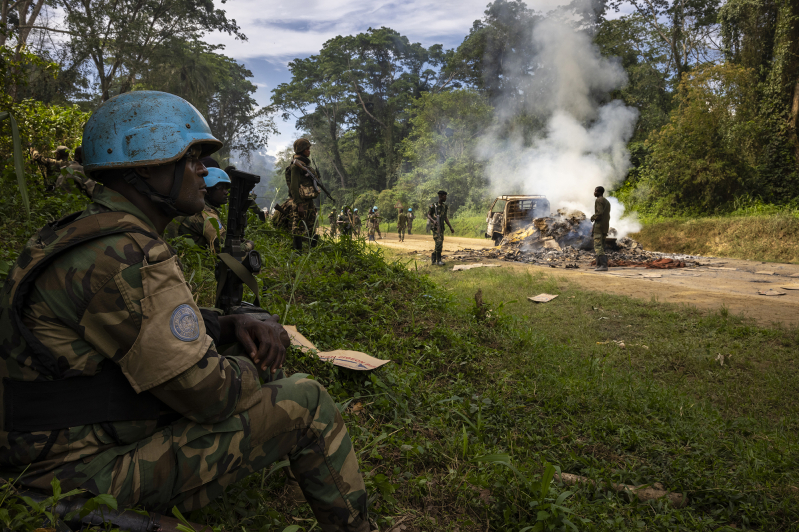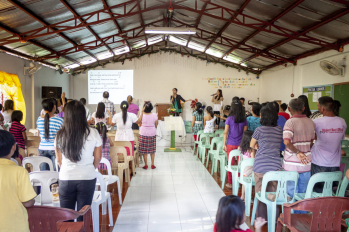
Islamic militants affiliated to ISIS killed 639 Christians in the Democratic Republic of Congo between January and June, 2024. This is according to a report released by the Middle East Media Research Institute (MEMRI), a US-based monitoring and analysis organization. The report revealed that out of the five African countries - DRC, Mozambique, Nigeria, Cameroon and Mali, 92% of the Christians fatalities happened in the DRC.
The report, which was produced by MEMRI’s Jihad and Terrorism Threat Monitor (JTTM), indicated that Islamic State Central Africa Province (ISCAP) claimed responsibility for either beheading or shooting 698 Christians in the five countries. In Mozambique and Nigeria, jihadists claimed to have killed 29 and 23 Christians respectively during the first-half of the year while 3 Christians lost their lives in Cameroon and 4 in Mali.
An additional 50 Christians in DRC were kidnapped in the first 6 months of 2024 while 93 Christian homes were torched. In Mozambique, ISIS claimed to have burned hundreds of Christian homes, churches and schools.
Matt Schierer, research fellow at MEMRI JTTM project, said the jihadists routinely publish photos and videos documenting attacks “in an effort to further terrorize the country’s Christian community.” He added that the nature of the executions claimed by ISCAP is also distinct compared to other IS affiliates in Nigeria, Mali and Cameroon, but has similarities with the Islamic State Mozambique Province group.
Over half of the total deaths in DRC were as a result of beheading. In one horrific attack on June 7, ISCAP claimed responsibility for the beheading of 60 Christians in Masala villages within North Kivu province.
“All attacks occurred in the DRC’s northeastern provinces of North-Kivu and Ituri, which border Uganda. Fatalities also rose sharply toward the end of the timeframe, with ISCAP claiming to have killed 300 Christians in June alone,” said Schierer.
It was also at the end of June that two aid workers from Christian charity organization Tearfund were killed in North Kivu. In a statement, Tearfund said the aid workers were traveling in a convoy that had arrived in Butembo from Lubero when they were attacked. It was unclear at this time whether the attack was carried out by the same groups.
“Tearfund unequivocally condemns this horrific attack on humanitarian aid staff who were working selflessly to serve the people of the DRC. Our priority now is to provide support to the families of our deceased colleagues during this incredibly difficult time. We are also working closely with the local authorities to ensure the safety and security of our remaining staff in the country,” said Tearfund in a statement.
Several armed groups such as the Allied Democratic Forces (ADF) and the March 23 Movement (M23) have continued to make inroads in the eastern parts of DRC especially in North Kivu, South Kivu and Ituri provinces. This has emboldened jihadists groups to attack Christians and burn churches contributing to the deteriorating state of security in eastern DRC.
A 2023 BBC Monitoring analysis of content published by ISIS revealed that ISCAP significantly increased the number of attacks on Christians in DRC by 57% compared to the previous half of 2022, an indication of the growing threats to Christians. Abdirahim Saeed, BBC Monitoring Jihadist Media Specialist, reported that the intensity of the attacks had shifted from Mozambique to DRC.
“The drop in IS attacks against Christians in Mozambique in 2023 does not necessarily mean the group is less interested in such targets, but is reflective of a major decline in the group’s activity in the country,” said Saeed.
Citing local media and analysts, Saeed said the attacks on Christians had intensified due to the involvement of ADF, which aligned itself to IS and has been reported to be involved in some of the attacks in North Kivu and Ituri.
Open Doors, a non-profit organization that monitors Christian persecution, warned that the situation in DRC “continues to be extremely violent and volatile for believers.”
“Church leaders who speak out against the violence are at risk of being targeted, making it difficult to raise their voices against the atrocities. The violence has led to a massive displacement crisis in the DRC, and many believers are among the displaced,” said Open Doors in its 2024 World Watch List assessment.
On July 8, UN special envoy Bintou Keita expressed hope that a 2-week humanitarian cease-fire in eastern Congo would be respected by DRC forces and the armed groups led by M23, in a conflict that threatens to pull in neighbors Uganda and Rwanda - who have been supporting the armed groups, according to the UN and the US.





